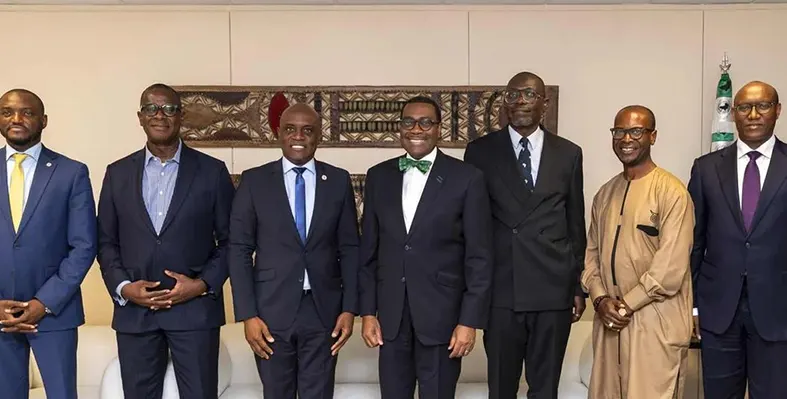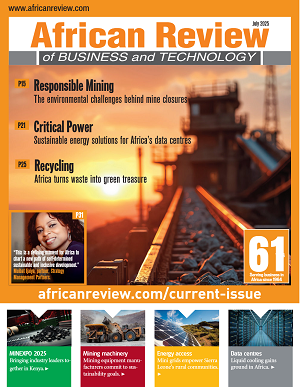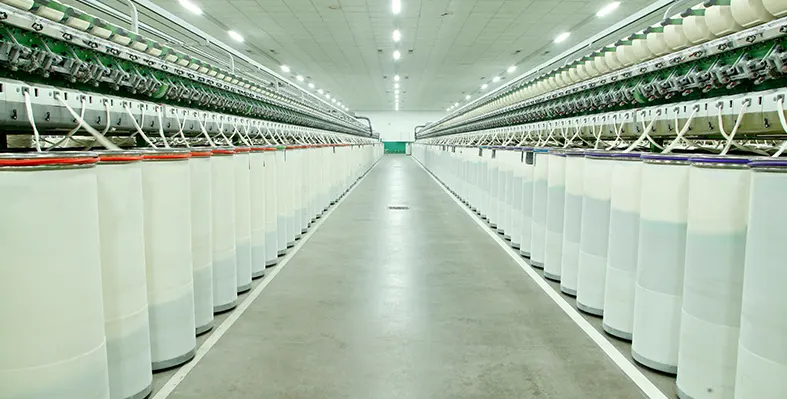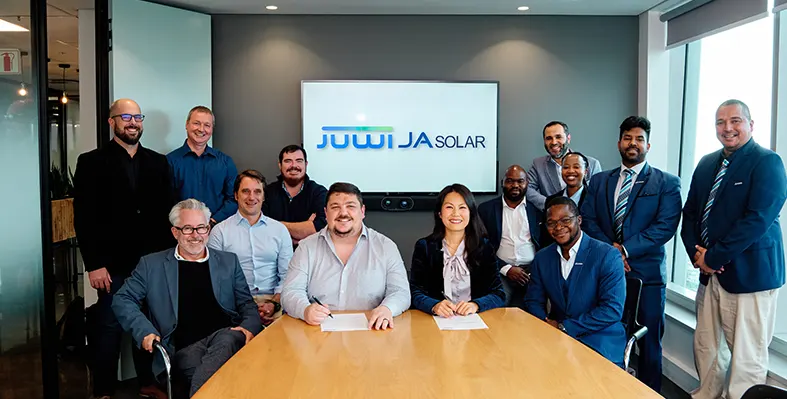In The Spotlight
JA Solar, a global leader in the photovoltaic (PV) industry, again is recognised as a 'Top Performer' in the 2025 PV Module Reliability Scorecard released by PV Evolution Labs (PVEL), a globally respected independent testing laboratory
The company’s DeepBlue 4.0 Pro module (model JAM66D45/LB) delivered outstanding results across multiple reliability test sequences, earning JA Solar this distinction for the tenth time.
This designation recognises JA Solar’s long-standing commitment to product quality and performance.
PVEL’s Reliability Scorecard, based on its Product Qualification Program (PQP), is widely regarded as an industry benchmark.
The program subjects PV modules to rigorous laboratory and field tests that simulate long-term operating conditions, thus helping buyers evaluate real-world durability and reliability.
In this year’s evaluation, the DeepBlue 4.0 Pro achieved strong results in a series of demanding tests, including thermal cycling, damp heat, mechanical stress, potential induced degradation, and light- and temperature-induced degradation.
The results validate the module’s ability to maintain high performance and structural integrity under a variety of environmental stressors.
“The fact that we were named a Top Performer by PVEL for the tenth time is both an honour and a responsibility,” said Aiqing Yang, executive president of JA Solar.
“It reflects our unwavering focus on quality and our drive to deliver reliable, high-efficiency products to global partners operating in increasingly diverse and challenging environments.”
The DeepBlue 4.0 Pro is already widely adopted in global markets, earning praise for its energy yield, long-term reliability, and adaptability.
Building on its success, JA Solar introduced application-specific solutions tailored to harsh climates—environments ranging from deserts to offshore to alpine to typhoon-prone regions—as well as specialised use cases such as anti-glare, lightweight, and fire-resistant modules.
With a decade of recognition from PVEL and a strong track record across global benchmarks, JA Solar is positioned to shape the next phase of the PV industry.
As the energy transition accelerates, the company is focused on advancing product reliability, expanding scenario-based solutions, and supporting the evolving needs of utility, commercial, and residential markets worldwide.
Read more:
Juwi and JA Solar partner on 220MW PV projects in South Africa
JA Solar powers ahead with South African manufacturing
JA Solar receives recognition for DeepBlue 4.0 Pro
President of Burundi, Évariste Ndayishimiye, has officially inaugurated the Jiji hydroelectric power station, located in the southern province of Bururi
It forms a component of the US$320mn Jiji and Mulembwe Hydropower Project, which includes associated transmission lines and substations.
Including the Mulembwe plant, set to be operational in the coming months, the two new Burundian power facilities will have a total installed capacity of 49.5MW and an estimated annual output of 235 gigawatt-hours of clean energy.
The combined output will supply electricity to 15,000 households, 7,000 businesses and 1,700 industrial facilities, providing a vital boost too for key industry sectors such as healthcare, education, agribusiness and ICT.
“2025 marks a new era in Burundi’s energy development. Just as water is essential to life, energy is crucial to development,” said President Ndayishimiye.
“I am convinced that this new source of available energy will enable new businesses to develop and transform production from different sectors.”
Funding for the project was sourced through a wide variety of multilateral institutions, led by the World Bank which provided US$149mn in financing.
The African Development Bank (AfDB) provided a further US$22mn in support, the European Investment Bank (EIB) US$36.6mn, and the European Union (EU) US$95mn.
The Government of Burundi and the Société d'électricité du Burundi (REGIDESO) also contributed US$16.7mn.
The World Bank's representative in Burundi, Hawa Cisse Wagué, said the Jiji hydropower plant and infrastructure would be transformative to the nation’s economic prospects.
“This infrastructure is like a solution for the economic and social development of Burundi. It represents a fundamental lever for improving access to energy for our populations, industrialisation, job creation and economic growth.”
During the construction phase, the project created several hundred jobs, stimulating the local economy and strengthening technical capabilities in the energy sector.
Edward Claessen, head of the EIB's regional hub for East Africa, highlighted the significance of the project’s renewable credentials, thereby reducing dependence on imported fossil fuels.
“Our funding for this project was part of the European Union's strategy to develop clean and sustainable infrastructure in Africa, and it is also aligned with decarbonisation efforts, which businesses need to grow.”
Read more:
Power grids, water systems, and various industrial operations often stretch into isolated regions where regular in-person supervision is not viable. In these cases, remote monitoring offers a practical solution — but only when the equipment is specifically built to endure the surrounding conditions
Gary Bradshaw, director at remote monitoring specialist Omniflex, outlines the technical demands of deploying such systems in harsh and inaccessible locations, and illustrates their use through a project with a major South African electricity utility.
Monitoring infrastructure in remote areas is fraught with challenges. These environments are frequently subject to extreme weather conditions such as high temperatures, humidity, dust, and electrical storms — all of which can compromise the performance and durability of monitoring equipment. Complicating matters further is the lack of readily available maintenance; deploying technicians to these areas involves considerable time, effort, and cost.
Another major hurdle is the absence of consistent power supply. With no mains electricity, these monitoring systems are reliant on batteries or, where feasible, solar power. Therefore, efficient energy usage is critical, along with pre-emptive battery replacement to prevent system failure and data loss.
Communication is also an obstacle. Remote locations often lack mobile network coverage, and traditional wired connections are cost-prohibitive to install. In such cases, radio and satellite communication are typically the only viable alternatives.
These issues are compounded by concerns about the longevity of monitoring systems. Many commercially available monitoring products are built with planned obsolescence, requiring full system replacements every few years. For hazardous and difficult-to-access sites, this poses both financial and safety concerns.
“For installations in remote and dangerous locations, this is not practical as sending engineers out to regularly replace equipment presents all the same challenges as in-person monitoring and equipment maintenance in terms of cost and risk. For these systems, remote monitoring equipment should ideally maintain full serviceability and compatibility for decades to minimise the need to dispatch engineers and technicians.”
Eskom’s remote monitoring evolution
In the early 1990s, South Africa’s electricity supplier Eskom faced operational difficulties in overseeing its remote assets, particularly 11kV and 22kV distribution lines that passed through isolated rural terrain. Frequent storms brought lightning strikes and fallen branches, which often triggered the auto-reclosers and sectionalisers, disrupting supply.
Restoring these services meant engineers had to navigate long distances — often at night and in hazardous conditions — just to diagnose and manually reset equipment. The problem was exacerbated by poor telecom infrastructure in those regions, causing delays in reporting and response.
To address this, Eskom partnered with Omniflex to implement a remote monitoring system capable of continuous, centralised supervision. The solution involved deploying Maxiflex remote terminal units (RTUs), mounted on power line poles and equipped to operate independently in the field.
“Maxiflex is a modular product that can be configured to suit a wide range of applications and its hot-swappable I/O modules enable maintenance without powering down the system, minimising any associated downtime.”
“The Maxiflex pole-mounted RTUs were mounted directly on power line poles alongside switching devices and interfaced to a central control centre over unlicensed radio bands for secure 24/7 monitoring. This solution allowed operators to receive real-time fault alerts and enabled them to remotely isolate line sections or reset devices without dispatching engineers.”
This was among the earliest deployments of Maxiflex and set the stage for its adoption in various critical infrastructure environments. Since then, the system has been employed in diverse applications globally — from nuclear radiation monitoring in the UK to alarm management and event sequencing in sectors such as oil and gas, petrochemicals, and utilities.
-

-

In the final webinar of its African Review-hosted 2023 campaign, Convergent Group explored its modern, eco-friendly concrete solutions for African projects
Such solutions – delivered to cut maintenance costs by eliminating hazardous silicate products – were showcased by company experts in the form of Jean-Claude Biard, SEO of Convergent Group SA; Mputu Schmidt, former CEO of Convergent Group SA and founder of Bondeko MB (exclusive distributor of Convergent Group in Africa); Carlos Garcia, technical and sales for ADI Group (Spanish distributor for Convergent Group); and Amritpal Singh Sura, external consultant for flooring treatments, former distributor of Convergent products in the Middle East.
“A number of projects we were doing in the Middle East required protection,” remarked Sura. “Longevity of protection requires a system which basically impregnates and becomes a densified surface as opposed to something which is topical and lifts off due to moisture migration. I found that being exposed to Convergent, it was important to stay focused on those systems in the Middle East. Jean-Claude, Mputu and I met several times in Dubai and there was emphasis on providing systems which were affordable and still ending up having a robust, lasting longevity of product. So you are not spending money all the time in order to maintain the finishes which you have already paid for.”
Over the course of the session, the participants guided the audience through the potential of cutting-edge lithium silicate technology for enhancing the protection of concrete surfaces, maximising cost-effectiveness and meeting sustainability targets.
-

In a comprehensive webinar hosted by African Review, a panel of professionals associated with Convergent Group explored new generation lithium silicate technology and why it is emerging as the optimum solution for concrete floor protection.
Robert Daniels, editor of African Review, was joined by Jean-Claude Biard, CEO of Convergent Group; Mputu Schmidt, former CEO of Convergent and founder of Bondeko MB, an exclusive distributor of Convergent; Hicham Sofyani, president of Texol; Carlos Garcia, technical and sales for ADI Group; and Marc Puig, commercial manager of Comace Import.
Each providing a unique angle, the panellists combined to provide a masterclass around concrete treatments and the increasing challenges around them, explaining to attendees how to choose the right formula for their requirements and touching on issues such as why lithium densifiers are better than sodium and potassium densifiers.
Throughout the session, those watching were treated to informative case studies showcasing how Convergent eco-friendly products are increasing abrasion resistance, raising ease of maintenance, and ensuring the highest quality gloss retention.
By the end of the webinar, a majority of attendees (many of which had not had much experience with Convergent) expressed their interest in using the company’s new generation lithium silicate technology with the rest indicating their desire to learn more about Convergent and its products. Watch the webinar, in full, to discover why viewers were convinced and learn more about advanced floor care solutions for your operations.
-

Presenting on an African Review-hosted webinar, Martin Provencher, global industry principal for mining, metals and materials at AVEVA, explored the digital transformation of mining operations and its impact on sustainability.
“Sustainability is becoming a key aspect for mining operations,” remarked Provencher. “If we look at the latest EY research on the top ten business risks and opportunities for mining and metals globally in 2023, ESG remains at the top. Of course, most companies have environmental goals or are expected to reach a net zero emission by 2050, which is a pretty aggressive target. Many of them are targeting 30% reduction by 2030; seven years from now. So there is a lot of action that needs to take place quickly to get there. It is possible to get there, but we need to make sure we are doing this correctly.”
Fast becoming a huge part of ESG initiatives is fleet electrification where particular progress is being made in underground mines. While some countries are certainly more advanced than others here, Provencher noted that 40% of total emissions from the mining industry come from diesel trucks, making EVs a very attractive low-hanging fruit for companies to pursue.
There are, however, a number of challenges associated with bringing in electric vehicles which remains a barrier for introduction. One of the predominant reasons, is the limited range of EVs against diesel counterparts. To mitigate this, Provencher continued, data management is key and ensuring a strong grasp of real-time information coming in will show operators when machinery needs to be charged, allowing them to plan effectively for maximum efficiency on site.
Indeed, this is but a small advantage that digitalisation can bring to the mining industry as it grapples to meet ESG goals while achieving production targets. By getting a better grip of their data and using it to empower tools such as artificial intelligence, advanced analytics and machine learning, companies can achieve tangible benefits such as reduce downtime, enhance worker safety, cut operating costs and, of course, ensure compliance with environmental regulations and targets.
Through the course of the webinar, Provencher outlined this in more detail and explored AVEVA’s suite of cutting-edge software solutions, specifically designed to help mining companies make progress on their digitalisation journey and empower their operations.
Watch the full webinar, completed with detailed case studies and an insightful Q&A session.
-

-

-

Convergent, in association with African Review, has held a detailed webinar exploring the usage and effectiveness of lithium silicates and densifiers over traditional methods of concrete surface management which often struggle to meet the increasing challenges posed by concrete surface management.
Convergent experts including Mputu Schmidt, CEO of Convergent; Carlos Garcia, product manager end-user solutions, construction chemicals, Spain and Portugal for the RD Group; Matteo Mozzarelli, CEO of concrete Solutions Italia; and Jean-Claude Biard, global senior executive for the Convergent Group, presented across the session.
Together, they delved into the latest cost-effective application methods for long lasting finishing of concrete that can help reduce maintenance costs and avoid unexpected repair action. In addition, they examined the advancements in technologies that can sustain increased abrasion resistant stains and ensure gloss retention to the highest quality.
As part of the webinar, the representatives explored case studies including a case in DRC where a medical centre had been constructed with a low-quality concrete floor. The customer was considering completely replacing the floor but instead, Convergent put forward a special treatment with its 244+ Pentra-Sil lithium hardener, densifier and sealer. With this solution, Convergent can increase the hardness of a surface by up to 40% and therefore saved the customer significant recuperation costs over a complete replacement. Convergent were happy to report that the solution was perfect for the facility and the customer was pleased to avoid the extra construction work that would have been required for a complete replacement.
Watch the full webinar, including more information about Convergent’s innovative solutions.
South Africa’s Red Sands battery energy storage project (BESS) has achieved financial close
The 153MW/612 MWh project, led by Globeleq and African Rainbow Energy, becomes Africa’s largest standalone BESS facility to reach the financial close milestone.
It follows the signing of project agreements between both companies and the Department of Electricity and Energy and the National Transmission Company South Africa (NTCSA).
Globeleq and African Rainbow Energy raised approximately around US$300mn in debt financing from Absa and Standard Bank.
Located near Upington in South Africa's Northern Cape, the Red Sands BESS will span approximately five hectares and supply electricity to NTCSA under a 15-year power purchase agreement.
The project includes significant upgrades to Eskom and NTCSA's grid infrastructure and will help ease transmission and distribution congestion in the region.
China Energy Engineering Corporation has been selected as the engineering and procurement contractor, with the BESS technology and long-term service agreement provided by Sungrow, a global leader in inverter and energy storage system solutions.
“Financial close on Red Sands BESS is a pivotal step in delivering Africa's largest standalone battery storage project,” said Globeleq's CEO Jonathan Hoffman.
"With strong backing from Absa and Standard Bank, and support from our public and private partners, we're advancing a more resilient, low-carbon power system.”
Johan Koorts, senior banker, resource and project finance at Absa, said the transaction demonstrates the bank’s commitment to Africa’s energy transition goals and will support the reliability and efficiency of electricity supply in South Africa.
Sherrill Byrne, head of project finance, energy and infrastructure at Standard Bank CIB, added: “This project is set to significantly enhance South Africa's energy requirements and contribute to grid stabilisation."
Globeleq, which led the development and financing process, will manage the project during construction and into operation through a subsidiary, Globeleq South Africa Management Services.
The project was originally developed by African Green Ventures and later acquired by Globeleq in 2023.
Red Sands BESS will be its second utility scale BESS in its renewable portfolio, adding to its 13 solar, wind and hybrid PV plus BESS plants in South Africa, Mozambique, Kenya and Egypt, plus the Menengai geothermal plant, currently under construction in Kenya.
Read more:
Globeleq advances Kenya Menegai geothermal
Globeleq to support Zambia hydro project
Gllobeleq signs up Sungrow for Red Sands project

Rovic’s new factory in Blackheath, Cape Town, with the overhead cranes manufactured by BB Cranes installed and commissioned. (Image source: Condra)
BB Cranes - a subsidiary of South African crane and hoist manufacturer Condra - has installed and commissioned five overhead cranes at a new agricultural machinery factory in Blackheath, Cape Town
Manufactured by BB at the company’s works in Rivergate Industrial Park, the customer, Rovic, which produces agricultural machinery, ordered the cranes as part of a workflow re-engineering to achieve shorter assembly times and improved staff safety.
The changes will help to increase production of the company’s large and small-grain planters.
Rovic manufactures a range of agricultural machinery marketed to customers worldwide under the Syncro brand, with products that include grain planters, mist blowers, spreaders and tillage equipment.
BB manager Jan Nel said the design of the cranes simplifies planter manufacture, allowing simultaneous assembly of individual machines at multiple points.
“We achieved this by fitting 12 independently operated hoists to each of two identical double-girder overhead cranes that we made for Rovic,” Nel said.
“There are six hoists on each crane. They work to assemble multiple planters without having to move the cranes themselves.”
Rovic’s improved assembly sequence replaces the use of forklifts, which in a separate factory used to move components on an as-and-when-required basis to individual planter assembly points serviced by fixed gantries.
In the new assembly sequence, operators position the cranes over planter assembly points arranged in rows across the factory floor.
The hoists work independently to service these points, picking and delivering planter chassis components and up to 53 identical planting units for fitting to each machine.
There are no fixed gantries to obstruct factory movement.
The six hoists fitted to each of the twin double-girder overhead cranes comprise two 3.2-ton crab-mounted units for the chassis components, and four underslung 1-ton hoists fitted two to each girder for the planting units.
All hoists work independently, the girders being spaced at a wider-than-normal 2.5 metres to allow the dedicated chassis hoists to adjust component positions, again without any need to move the cranes.
All the hoists are also fitted with Optidrive variable-speed drives supplied by iTek.
A third BB overhead crane, a 20-tonner, moves completed planters out of the factory for shipping.
In addition, there are two further 2-ton single-girder BB cranes in the Rovic factory, bringing the total to five.
Read more:
Condra expanding agent network after Tanzania crane deal
Cape Town company sets new record with boatbuilding crane
Condra completes second acquisition this year

BME's Dryden Innovex manufacturing plant outside of Delmas, Mpumalanga in South Africa (Image source: BME)
BME has outlined its commitment to sustainable mining by incorporating used oil, a hazardous waste, as an ingredient in emulsion explosives
“Through our scientifically rigorous processes, we convert a waste product into a sustainable energy source that can break ground to meet the demands of mining while also promoting environmental sustainability and socio-economic development,” said Sachin Govender, used oil manager at BME.
“Used oil is a major environmental risk. Just one litre can contaminate about a million litres of South Africa’s scarce water resources.”
By consuming up to 20% of all the country’s used oil for the production of emulsions, BME helps to effectively mitigate this risk – while also helping to uplift local communities from where it sources the used oil.
The company utilises used oil as a bioenergy fuel source that is completely consumed in the blasting process — a system it has honed and refined over three decades.
The well-developed and accurate formulations comply with safety regulations and adhere to the company’s ESG goals, said Govender.
He said that while used oil was readily available as it was a waste product, there were various grades, all containing different contaminants and components.
“Therefore, all of the used oil that we collect and process undergoes extensive verification, quality control analysis and validation at our R&D laboratory,” he said.
“The final emulsions that we produce using these technologies are also quality tested to determine their stability, shelf life and efficiency for mining.”
He confirmed that BME was also investigating viable alternatives to traditional used oil.
This would not only enable the company to further pursue greener and more sustainable sourcing, but would also increase its participation in the circular economy.
Read more:
Mining chemicals storage boost for BME
Omnia strengthens global mining offering through rebrand
Blasting solutions for potential acidic sulphate soil

African Development Bank funds feasibility for Rwanda’s US$100mn cable car to improve urban transport access. (Image source: AfDB)
The African Development Bank (AfDB) has approved a US$500,000 grant to fund a feasibility study for Kigali’s proposed aerial urban transit system, set to become sub-Saharan Africa’s first cable car network
The initiative is being spearheaded by Ropeways Transit Rwanda Ltd (RTRL).
The funding comes from the Bank’s Urban and Municipal Development Fund (UMDF) and will support the development of the Kigali Urban Cable Car Project. Valued at US$100mn, the 5.5 km transport solution is designed to alleviate traffic congestion, cut greenhouse gas emissions, and improve access to jobs and essential services for underserved communities.
Hosted by the African Development Bank, the UMDF provides technical assistance and financial support to cities, helping them identify and prepare investment-ready urban projects.
Phase 1 of the project will cover two main routes: from Nyabugogo Taxi Park to the Central Business District, and from the Kigali Convention Center to Kigali Sports City, passing key landmarks such as Amahoro Stadium, BK Arena and Zaria Court.
The feasibility study aims to attract international investment, potentially through platforms such as the Africa Investment Forum (AIF). UMDF has previously supported Rwanda’s Kigali Urban Transport Improvement Project to enhance investor confidence in the transport sector.
Construction is expected to begin in late 2026, with commissioning planned for 2028. Once operational, the system could carry over 50,000 passengers daily on a 15-minute end-to-end journey, fully integrated with Kigali’s broader transport network.
African Development Bank Group president Dr. Akinwumi Adesina said, “This transformative project aligns perfectly with the Bank’s vision for sustainable, green climate-resilient urban mobility infrastructure, and with the Bank’s Ten-Year Strategy, which focuses on urbanisation, and the Alliance for Green Infrastructure in Africa (AGIA), a global partnership initiative driven by the African Development Bank Group, Africa50 and the African Union. By financing Rwanda’s urban cable car system, we are investing in a scalable model of low-carbon, inclusive public transport that cities across Africa can emulate.”
The project also supports Rwanda’s climate targets, as outlined in its Green Taxonomy, E-mobility Strategy and Climate and Nature Finance Strategy, aiming to cut emissions by 38% by 2030 and reach carbon neutrality by 2050.
The cable car project will be implemented under a Public-Private Partnership (PPP), according to Imena Munyampenda, Director General of the Rwanda Transport Development Agency.
The feasibility phase will draw insights from successful cable car systems in cities like La Paz, Bolivia and Singapore, and will incorporate inclusive design principles for disabled access and employment opportunities for women, low-income groups, and youth.
Blended financing model
The project’s US$100mn financing will include grants, concessional loans, blended capital, and technical assistance. The UMDF grant will specifically support assessment of the viability gap. The Rwandan government will partner with the African Development Bank Group and others including IFC, Africa50, TDB, AFC, and private investors under the AGIA to structure blended and commercial finance.
South Africa has entered into a US$1.5bn loan agreement with the World Bank to support the revitalisation of its transport and energy infrastructure and stimulate economic recovery, the National Treasury announced recently
For over ten years, Africa’s most industrialised economy has faced stagnation, hindered by ongoing power outages that have reduced productivity and deteriorating rail systems and port congestion that have impacted key industries like mining and automotive manufacturing.
The government expects the loan to help alleviate transport constraints and bolster energy security, although it has not disclosed which specific projects the World Bank funds will support.
The loan is expected to help manage the country’s rising debt-service burden by offering more favourable conditions than those available in commercial markets, including a three-year grace period.
State-run utilities Eskom and Transnet, responsible for energy and transport respectively, have faced long-standing operational and financial difficulties, contributing to the country’s sluggish growth, which stood at only 0.1% in the first quarter.
The Treasury stated that the interest rate on the 16-year loan from the World Bank is the six-month Secured Overnight Financing Rate plus 1.49%.
This facility is distinct from another US$500mn in funding that the World Bank Group is considering to help mobilise private investment in South Africa’s electricity transmission infrastructure, which needs to be expanded to accommodate more renewable energy projects.
Last month, Finance Minister Enoch Godongwana outlined a budget that includes over 1 trillion rand (US$55.5bn) in investment across sectors including transport, energy, water and sanitation, aimed at driving growth and improving public services.
It aimed for public debt to peak at 77.4% of gross domestic product in the current fiscal year, slowly declining after that.
Jumia, Africa’s leading e-commerce platform, has taken a significant step in reinforcing its presence in Egypt with the inauguration of a new integrated warehouse on Suez Road, Cairo
This development marks one of Jumia’s largest investments in the country and demonstrates its continued confidence in Egypt’s strategic role in Africa’s economic and logistical landscape.
Spanning over 27,000 sq m, the new facility is designed to optimise Jumia’s logistics capabilities by improving storage efficiency and speeding up deliveries, particularly to Upper Egypt. The warehouse is equipped with advanced smart systems that enhance order processing and customer satisfaction. As a key component of Jumia’s logistics infrastructure, the centre supports the company’s future expansion and aims to better serve merchants and consumers across the country.
This investment aligns with Jumia’s mission to boost Egypt’s digital economy and enhance its service offerings. It will also provide tailored logistics solutions for local manufacturers and merchants, reinforcing the platform’s support for domestic production.
The warehouse is projected to generate up to 10,000 direct and indirect jobs over the coming years, solidifying Jumia’s contribution to national economic development and youth empowerment.
Prime minister Dr Mostafa Madbouly commended the initiative, remarked, "We welcome this move by Jumia, which reflects the trust that major global companies have in Egypt’s investment climate. We look forward to more partnerships that support the state's goals in digital transformation, the development of logistics infrastructure, and the provision of job opportunities for Egyptian youth."
Abdel Latif Olama, CEO of Jumia Egypt, expressed his appreciation for the government’s support, stated, "We are proud of this achievement, which reflects Jumia’s long-term investment commitment in Egypt. We view Egypt as a strategic hub for our operations in the region. This warehouse represents a qualitative leap in the level of services we provide to our customers and partners, and it supports our vision of becoming an integrated platform that combines technology and logistics across the continent. It will also contribute to our growth in the Egyptian market."
Egypt also plays a critical role in Jumia’s tech ecosystem, hosting one of its largest technology hubs on the continent. This centre is home to a skilled team of engineers and developers who are building digital tools and logistics solutions to support operations across Africa.
During the inauguration, Olama delivered a presentation detailing Jumia’s impact in both Egypt and broader African markets. He also outlined plans for future expansion, reaffirming Egypt’s strategic importance to the company.
The launch of this facility is part of Jumia’s wider expansion strategy aimed at strengthening its infrastructure across Africa. Similar logistics centre s have already been established in Nigeria, Ghana, Ivory Coast, and Morocco, reinforcing the company’s role in advancing digital commerce and economic development across the continent.

































































